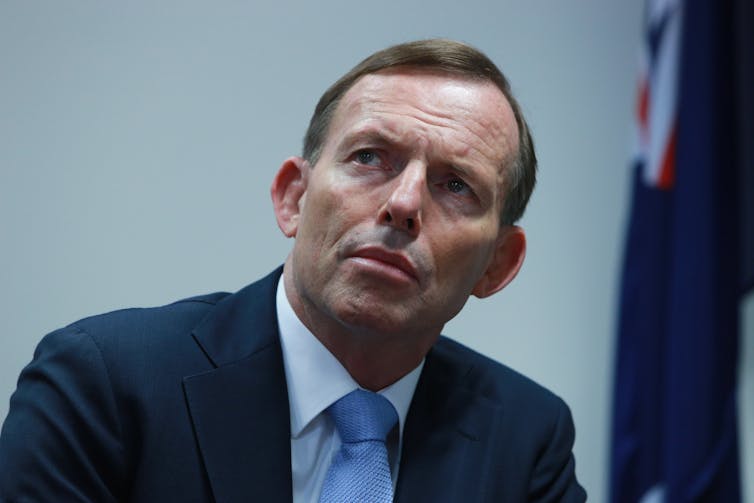
Well at least Barack Obama will be prepared when he meets Tony Abbott next month. An article about Abbott’s tribulations on The Washington Post homepage is accompanied by a video of the PM blinking – repeatedly. An amused president will probably be on the lookout.
The story describes Abbott “quickly becoming one of the world’s most hated prime ministers”.
As the government sucks in its collective breath in preparation for a rugged parliamentary week – including the start of difficult behind-the-scene negotiations over budget items – some strategic minds should be thinking about how to deal with two other issues, soon to come to a head, that have key constituencies upset.
One is the proposed change to the Racial Discrimination Act, which has triggered a backlash from ethnic communities and the Jewish lobby. The second is the planned watering down of Labor’s financial advice legislation that has seniors groups up in arms.
Section 18c of the RDA outlaws actions likely to “offend, insult, humiliate or intimidate” someone because of their race or ethnicity. The government’s exposure draft legislation removes offend, insult and humiliate, leaves in intimidate and adds a new provision against vilification.
In reply to its call for views, the government has received more than 5300 submissions; Attorney-General George Brandis is working on a new draft, to go to cabinet within weeks.
The move to change the act was driven by the judgment against right-wing commentator Andrew Bolt, who reflected pejoratively on the motivation of a group of fair-skinned Aborigines. But Brandis told The Australian this week the proposed amendment was “about a much broader principle and the principle is this: should government be passing laws telling people what they are allowed to think and what opinions they are allowed to express?”
Unfortunately for the government, that is not what many in the ethnic communities see as the issue. They regard the present RDA provisions as a protection – in practice not so much because legal action can be taken but because they set a community standard for behaviour. Much of the work undertaken is conciliation.
Some Liberals observe that the act was there all through the Howard years and there was no push for change. The freedom of speech issue has come to the fore recently (post Bolt), but it is hard to see precisely what problem it is addressing. The judgement in the Bolt case is mostly considered an outlier.
Caught between the ideology of the free speech purists and the pragmatism of backbenchers with large ethnic constituencies, the government seems headed for a train crash, with some of its MPs at risk of injury. If the draft’s wording is changed only marginally, these members will feel even more heat; any substantial compromise will have the government flayed by the internal and external forces of the right. The second alternative would pose the lesser danger to its wider political welfare.
A very different but also sensitive constituency is agitated about the move to change the Future of Financial Advice (FoFA) legislation.
The government plans to water down the requirement under which advisers must act in clients’ best interest; scrap the “opt-in” provision that advisers every two years must get clients to agree to continue to receive their service; limit the annual disclosure measure so it applies just to post-July 1, 2013 clients; and apply the ban on “conflicted renumeration” only to the provision of personal advice - exempting general advice provided by employees of banks and product manufacturing institutions.
This week National Seniors and the Council on the Aging told a Senate inquiry the changes would be against the interests of the people they represented.
COTA chief executive Ian Yates said: “The proposed changes remove important safeguards which were put in place following the disasters of Storm Financial and West Point to stop inappropriate products being sold to vulnerable community members”.
The amendment of FoFA was under the auspices of Arthur Sinodinos until he had to stand aside as Assistant Treasurer because of the ICAC inquiry into Australian Water Holdings. Financial Minister Mathias Cormann (who in opposition had had carriage of the issue) took over the Sinodinos responsibilities and put matters on hold while the Senate inquiry was on and other consultations held. The inquiry is due to report mid-June.
The changes as proposed have been seen as advantaging the big end of town, in particular the banks. The government’s argument about getting rid of red tape and making advice more affordable has not been able to counter the worries about safeguards.
And those worries are about to be reinforced. Another Senate inquiry, into the performance of the Australian Securities and Investments Commission (ASIC), has reviewed the actions of the Commonwealth Bank regarding inappropriate advice, and this report is due next week.
It is anticipated it will heavily criticise the behaviour of the Commonwealth Bank. That will reinforce doubts about the proposed loosening of the consumer protection in the financial advice law.
The very free-market Cormann has strong views on cutting regulation, but this would tip the scales further in favour of the banks. But against the background of the Commonwealth Bank affair, others in the Coalition will be concerned.
As with so much in this parliament, the Senate will be the final arbiter of the RDA and the FoFA changes. If both bit the dust the government might well owe the upper house a favour.
Listen to Michelle Grattan’s newest podcast, with ACT Chief Minister Katy Gallagher, here.
